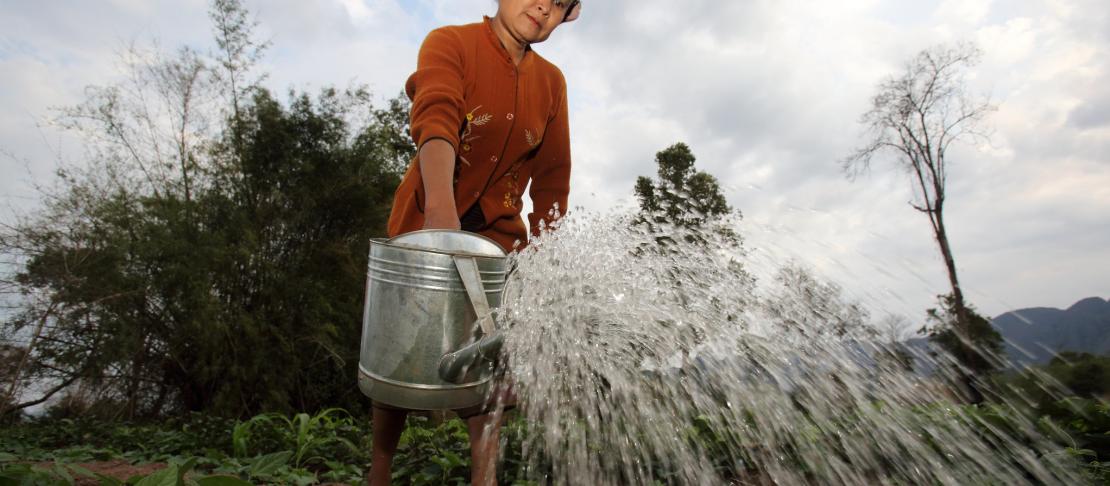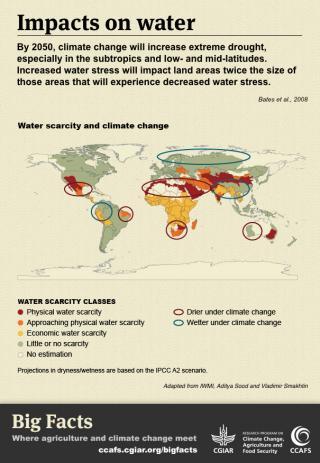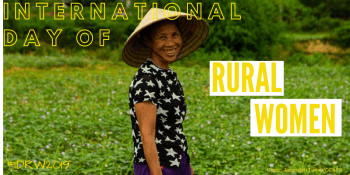Water in a changing climate: can we do more with less?

by Vanessa Meadu
How do we feed two billion more people with less water under changing climate? Professor Colin Chartres and colleagues challenged those of us at the Global Science Conference on Climate Smart Agriculture to think about this paradox.
The conference, hosted by University of California Davis, has gathered the world's top researchers on climate change and food security to share solutions and innovations, and map out a path forward for a food-secure future. Water is a major concern.
Chartres, formerly Director General of the International Water Management Institute of the CGIAR, shared some frightening numbers about water availability in a changing climate. On the one hand, as countries get richer, demand for water increases, thanks to more industrial and agricultural activity, and more people eating meat for example (growing livestock is very water-intensive). On the other hand, climate change is expected to contribute to water scarcity thanks to rising temperatures and more frequent extreme weather events such as droughts.
See his presentation below:
The Food and Water Paradox - Dr Colin Chartres from International Water Management Institute (IWMI)
But not all hope is lost: many of the solutions are already out there, but need be done together as part of integrated climate change adaptation strategies. These solutions include improving irrigation efficiency and water productivity; better water storage; more water recycling and reuse; better efficiency for industrial and urban users; and reducing food waste. We already waste one-third of all food globally; all the water used to grow and process this food is completely wasted as well.

There is clear evidence of water shortages from around the world. Francisco Meza (Catholic University of Chile: Climate Change Center), shared research from Chile's Maipo basin, which projects up to a 40-percent reduction in stream flows in the coming decades. Urban and rural people who depend on water have varying capacities to deal with such shocks; the agriculture sector, he said, would be hit the hardest.
In Vietnam's Mekong Delta, over a million people rely on coastal ecosystems for survival. Aquaculture is a huge source of income, particularly farming shrimp for export. Nhuong Tran, a researcher from WorldFish, is working with communities to enhance climate change resilience in Mekong Delta's coastal aquaculture systems. His work, funded by the CGIAR Research Program on Climate Change, Agriculture and Food Security (CCAFS), aims to integrate climate change adaptation into Vietnam's development planning.
Working closely with farmers, the team at WorldFish is looking at a range of adaptation options and even seeing whether sea level rise may bring new, and unexpected opportunities. They are also exploring how to reduce the dependence on shrimp and catfish which currently predominate. For example, there may be undeveloped markets for new fish species, and there may be opportunities to shift away from shrimp monoculture by integrating shrimp and rice cultivation.
Nhuong emphasised the need to pay attention to the diversity of small scale systems, rather than seek 'silver bullet' solutions such as large scale intensification. Crucial next step in this region will need to protect and conserve sensitive coastal ecosystems; provide incentives for farmers to restore mangroves, and implement ecosystem based approaches to aquaculture.
In most parts of the world farmers are already feeling the effects of sea level rise, erratic temperature and rainfall, increasing storms and reduced water availability. Good water management in a changing climate is ultimately a question of survival that affects us all.
Read more
Kam, S.P, M-C. Badjeck, L. Teh, L. Teh, and N. Tran. 2012. Autonomous adaptation to climate change by shrimp and catfish farmers in Vietnam’s Mekong River delta. WorldFish, Penang, Malaysia.
Vanessa Meadu is Communications and Knowledge Manager at the CGIAR Research Program on Climate Change, Agriculture and Food Security (CCAFS). She is reporting live from the Global Science Conference on Climate Smart Agriculture from 20-22 March 2013. Follow our live reports from the conference on our blog and on twitter @cgiarclimate using #climatesmart.


